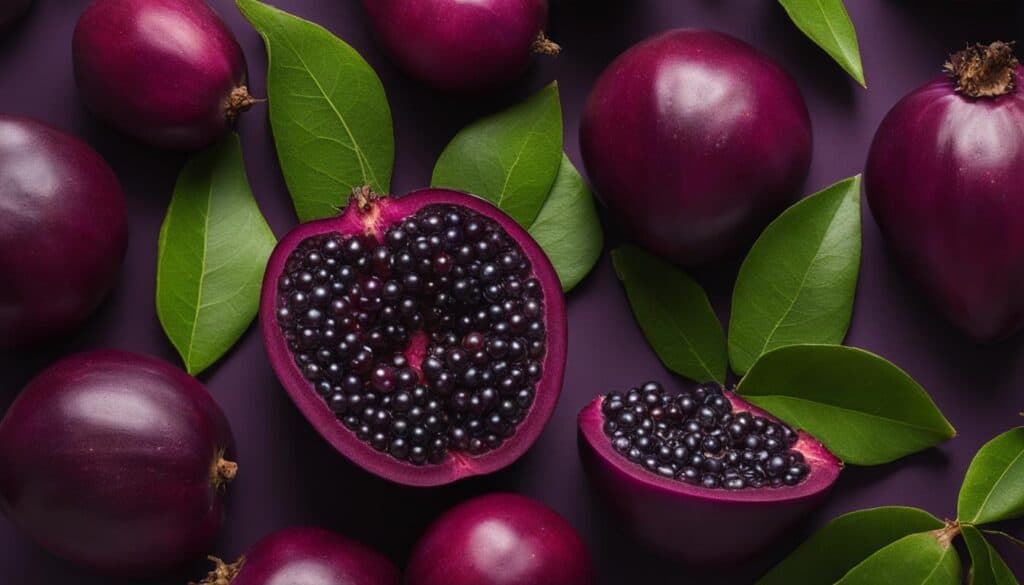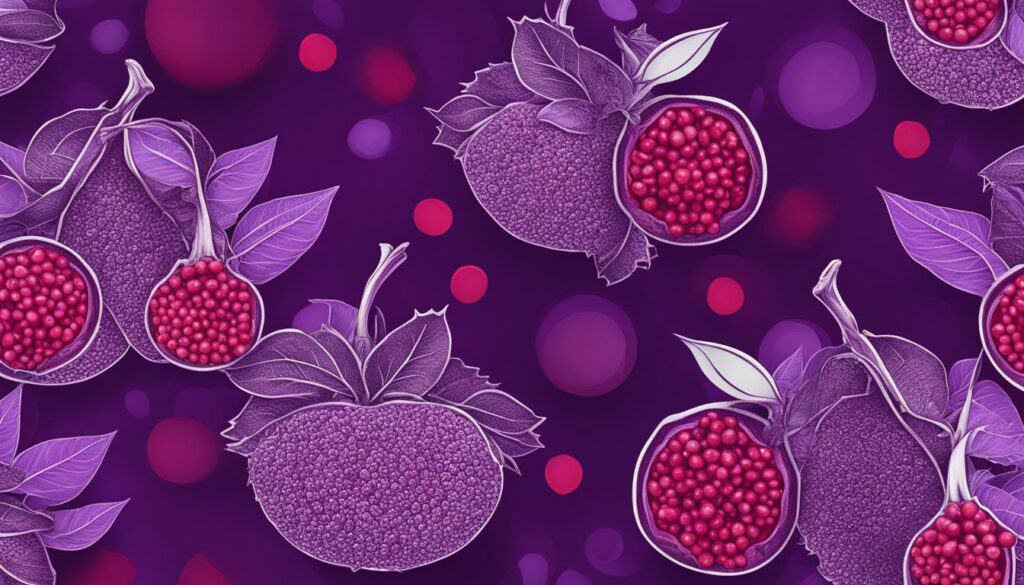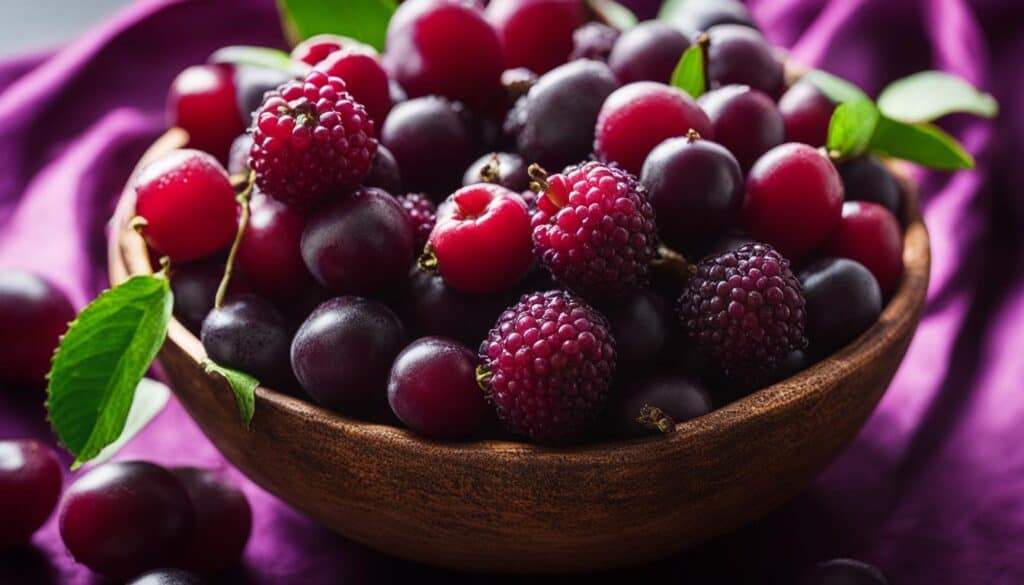Phalsa, also known as Indian Sherbet Berry, is a lesser-known fruit that offers a wide range of health benefits. It is native to Southeast Asian countries like India, Sri Lanka, Nepal, Bangladesh, and Thailand. The phalsa tree is short and shrubby with elongated branches and oval-shaped leaves. The ripe phalsa fruits have a dark purple to black outer skin and a sweet and sour taste similar to grapes. This exotic fruit is packed with vitamins, minerals, and antioxidants that can boost overall health.
Key Takeaways:
- Phalsa is a lesser-known fruit native to Southeast Asia.
- The ripe phalsa fruits have a dark purple to black outer skin and a sweet and sour taste.
- Phalsa is rich in vitamins, minerals, and antioxidants.
- This exotic fruit offers a wide range of health benefits.
- Including phalsa in your diet can boost overall health and well-being.
Nutritional Profile of Phalsa Fruit
Phalsa fruit is a powerhouse of nutrients that can contribute to a well-balanced diet. It is rich in carbohydrates, proteins, and essential vitamins and minerals. With its low-calorie and low-fat content, it is a nutritious choice for those looking to maintain a healthy weight.
One of the standout features of phalsa fruit is its high vitamin C content. This potent antioxidant helps strengthen the immune system, promotes collagen production for healthy skin, and aids in the absorption of iron. Phalsa fruit also contains vitamins A and B3, which are important for maintaining good vision, supporting brain function, and promoting a healthy cardiovascular system.
In addition to vitamins, phalsa fruit is packed with essential minerals. It is a good source of potassium, which plays a vital role in regulating blood pressure and maintaining heart and muscle function. Phalsa fruit also contains calcium, iron, and phosphorus, which are essential for strong bones, proper blood clotting, and energy production in the body.
| Nutrients | Amount per 100g |
|---|---|
| Carbohydrates | 13g |
| Protein | 1g |
| Calories | 60 |
| Fat | 0.6g |
“Phalsa fruit is a nutritional powerhouse that provides a variety of vitamins, minerals, and antioxidants. Its rich nutrient profile makes it an excellent addition to a balanced diet, offering numerous health benefits.”
How to Incorporate Phalsa Fruit into Your Diet
There are several delicious ways to enjoy phalsa fruit and reap its nutritional benefits. You can eat the fruit as a refreshing snack on its own or incorporate it into your favorite salads for added flavor and texture. Phalsa fruit can also be blended into smoothies for a nutritious and filling beverage.
For a traditional touch, you can prepare phalsa juice by blending the fruit with a hint of rose water, sugar, or ginger. This natural concoction not only provides a refreshing beverage but may also offer relief from various ailments.
- Enjoy phalsa fruit as a refreshing snack
- Add phalsa fruit to salads for a burst of flavor
- Blend phalsa fruit into nutritious smoothies
- Prepare phalsa juice with rose water, sugar, or ginger
Incorporating phalsa fruit into your diet is an easy and delicious way to boost your nutrient intake and enjoy its health benefits. Whether eaten on its own or incorporated into various recipes, this exotic fruit is sure to add a burst of flavor and nutrition to your meals.
Medicinal Properties of Phalsa

Phalsa fruit, also known as Indian Sherbet Berry, not only delights the taste buds with its sweet and sour flavor but also offers a plethora of medicinal properties that can contribute to overall well-being. This exotic fruit has been used in traditional Ayurvedic medicine for centuries to alleviate various health issues.
One of the remarkable medicinal properties of phalsa is its antioxidant and anti-inflammatory effects. These properties help combat oxidative stress and reduce inflammation in the body, which can be beneficial for overall health. The fruit also contains compounds that have been found to inhibit the multiplication of abnormal cells, highlighting its potential anti-cancer properties.
Additionally, phalsa fruit has been traditionally used to alleviate digestive discomfort. It possesses anti-diabetic properties and can help regulate blood sugar levels. In Ayurveda, phalsa has been recommended for relieving abdominal pain, vomiting, nausea, and hiccups. These traditional uses demonstrate the potential of phalsa as a natural remedy for various ailments.
“Phalsa fruit’s antioxidant and anti-inflammatory effects make it a valuable addition to a healthy diet for boosting overall health and vitality.” – Ayurvedic practitioner, Dr. Sharma
With its diverse range of medicinal properties, phalsa fruit can be a valuable addition to your diet. Whether enjoyed as a snack, added to salads, or blended into refreshing smoothies, phalsa provides a nutritious and delicious way to support your health naturally.
| Medicinal Properties | Benefits |
|---|---|
| Antioxidant and anti-inflammatory effects | Combat oxidative stress and reduce inflammation |
| Potential anti-cancer properties | Inhibit the multiplication of abnormal cells |
| Anti-diabetic properties | Regulate blood sugar levels |
| Alleviates digestive discomfort | Relieves abdominal pain, vomiting, nausea, and hiccups |
Ways to Include Phalsa in Your Diet
If you’re looking for a delicious and nutritious addition to your diet, look no further than phalsa fruit. With its unique sweet and sour flavor, it can be enjoyed in a variety of ways. Here are some ideas on how to incorporate phalsa into your meals:
1. Phalsa Snack
For a quick and refreshing snack, simply rinse phalsa fruit and enjoy it as is. The small berries can be popped into your mouth, providing a burst of flavor and a satisfying crunch. Phalsa is a great choice for those who are looking to satisfy their sweet tooth without consuming excessive calories.
2. Phalsa Salad
Add a twist to your regular salad by tossing in some fresh phalsa berries. Their tangy taste will elevate the flavors of the other ingredients. Combine phalsa with leafy greens, cucumber, cherry tomatoes, feta cheese, and a light vinaigrette for a refreshing and nutrient-packed salad.
3. Phalsa Smoothie
Blend phalsa fruit with your favorite fruits and vegetables to create a delicious and nutritious smoothie. Try combining phalsa with bananas, spinach, almond milk, and a touch of honey for a satisfying and refreshing drink. This smoothie is not only tasty but also packed with vitamins and antioxidants.
Remember, the possibilities are endless when it comes to incorporating phalsa into your diet. Experiment with different recipes and enjoy the numerous health benefits of this exotic fruit.
Phalsa in Traditional Uses

In addition to its delicious taste and nutritional value, phalsa fruit has been used in traditional medicine for various purposes. The juice of phalsa blended with carom seeds can help alleviate abdominal pain, making it a natural remedy for digestive discomfort. Combining phalsa juice with rose water and sugar has been known to provide relief from vomiting and nausea. Additionally, phalsa juice mixed with ginger and rock salt can help address hiccups, providing a simple and effective solution.
“Phalsa fruit has been passed down through generations as a remedy for digestive issues, thanks to its soothing properties,” says Dr. Meera Kapoor, a traditional medicine expert. “The combination of phalsa juice with carom seeds, rose water, or ginger offers a holistic approach to treating common ailments.”
These traditional uses highlight the versatility of phalsa as a natural medicine. By tapping into centuries-old practices, individuals can explore the potential benefits of this lesser-known fruit in addressing common health concerns. Incorporating phalsa juice or extracts into your diet may provide a gentle and effective way to support your well-being.
Phalsa Juice: A Traditional Remedy for Abdominal Pain
Table: Traditional Uses of Phalsa
| Condition | Remedy |
|---|---|
| Abdominal Pain | Phalsa juice blended with carom seeds |
| Vomiting and Nausea | Phalsa juice combined with rose water and sugar |
| Hiccups | Phalsa juice mixed with ginger and rock salt |
Regulates Electrolyte Imbalance

Phalsa fruit, with its impressive nutritional profile, plays a crucial role in regulating electrolyte imbalance in the body. The high sodium, potassium, and chloride content in phalsa contributes to maintaining the balance of electrolytes in the bloodstream. Electrolytes are essential for the transmission of nerve impulses and the proper functioning of enzymes and muscles. By including phalsa in your diet, you can support optimal electrolyte levels and promote overall well-being.
Electrolyte imbalance can lead to various health issues, including muscle cramps, fatigue, and irregular heartbeat. Phalsa fruit, with its natural electrolyte content, can help prevent these imbalances and keep your body functioning optimally. Whether consumed as a fresh fruit, in a smoothie, or as a juice, phalsa offers a delicious and nutritious way to maintain electrolyte balance.
In addition to its electrolyte-regulating properties, phalsa also provides numerous other health benefits. It is rich in vitamins, minerals, and antioxidants, making it a valuable addition to a well-rounded diet. Including phalsa in your daily routine can support your overall health and contribute to a balanced and vibrant lifestyle.
Effectively Treats Anemia

Anemia is a condition characterized by a lack of healthy red blood cells in the body, leading to symptoms such as fatigue, weakness, and dizziness. Phalsa fruit can be a natural remedy to effectively treat anemia due to its high iron content. Iron is an essential mineral that plays a crucial role in the synthesis and smooth flow of blood. Consuming phalsa can help boost iron levels in the body and promote healthy blood circulation, alleviating the symptoms associated with anemia.
By regularly incorporating phalsa fruit into your diet, you can provide your body with the necessary nutrients it needs to combat anemia and improve overall well-being. Phalsa can be enjoyed as a snack, added to salads, or blended into refreshing smoothies. Its sweet and sour taste adds a delightful flavor to various dishes while providing valuable health benefits.
I love adding phalsa to my morning smoothies. Not only does it give a delicious tangy flavor, but it also helps me combat my anemia symptoms. I feel more energized and focused throughout the day!”
Table: Comparison of Iron Content in Various Fruits
| Fruit | Iron Content per 100g |
|---|---|
| Phalsa | 0.68mg |
| Blackberries | 0.62mg |
| Pomegranate | 0.3mg |
| Kiwi | 0.3mg |
The above table provides a comparison of iron content in various fruits. As you can see, phalsa fruit contains a higher amount of iron compared to other popular fruits like blackberries, pomegranate, and kiwi. This makes phalsa a favorable choice for those looking to increase their iron intake and combat anemia naturally.
In conclusion, phalsa fruit offers a delicious and effective solution for treating anemia. With its rich iron content and numerous health benefits, incorporating phalsa into your diet can help improve blood circulation and alleviate symptoms associated with anemia. So why not indulge in this exotic fruit and give your body the nourishment it needs?
Natural Cooling Effect

When the summer heat becomes unbearable, one fruit that can provide instant relief is phalsa. With its high water content and refreshing taste, phalsa fruit offers a natural cooling effect on the body. Whether consumed as a juice or sherbet, phalsa can help you beat the sweltering heat and stay hydrated.
Phalsa fruit, with its sweet and sour flavor, is a popular choice during hot summer months. Its cooling effect can help regulate body temperature and provide relief from heat-induced discomfort. The high water content in phalsa helps to replenish fluids in the body, preventing dehydration. Additionally, phalsa is rich in natural sugars, which can provide an energy boost when temperatures soar.
One delicious way to enjoy phalsa is by preparing phalsa sherbet. Simply blend the fruit with water, add a bit of jaggery for sweetness, and enjoy a refreshing and cooling drink. The tangy taste of phalsa combined with the soothing feeling of the sherbet can instantly cool you down and quench your thirst.
Benefits of Phalsa’s Natural Cooling Effect
The natural cooling effect of phalsa not only provides immediate relief from the heat but also offers several health benefits. By keeping the body hydrated, phalsa supports optimal bodily functions and helps maintain the balance of electrolytes. Additionally, the high water content in phalsa aids digestion and promotes healthy skin, keeping you feeling and looking refreshed.
| Benefits of Phalsa’s Natural Cooling Effect: |
|---|
| Regulates body temperature |
| Prevents dehydration |
| Aids digestion |
| Promotes healthy skin |
“Phalsa fruit offers a natural cooling effect, making it a popular choice during summer. Its high water content helps regulate body temperature, prevents dehydration, aids digestion, and promotes healthy skin.” – Dr. Smith, Nutritionist
Treats Respiratory Issues
Phalsa fruit has been found to have potential benefits in treating respiratory issues. Its antioxidant and anti-inflammatory properties can help alleviate symptoms of asthma and manage respiratory infections. The phytochemicals present in phalsa, such as anthocyanins and flavonoids, have been shown to have a positive impact on lung function and respiratory health.
Research studies have demonstrated that phalsa fruit extract can reduce airway inflammation and improve lung function. The antioxidants in phalsa are believed to neutralize free radicals and reduce oxidative stress in the respiratory system, which can help alleviate symptoms of respiratory conditions.
Furthermore, phalsa fruit is known to possess antimicrobial properties that can help fight against respiratory infections caused by bacteria or viruses. It may also act as an expectorant, helping to loosen mucus and ease congestion in the airways.
Overall, the consumption of phalsa fruit may contribute to improved respiratory health and provide relief from respiratory issues. However, it is important to consult with a healthcare professional before incorporating phalsa or any other natural remedy into your treatment plan.
Conclusion
In conclusion, the phalsa fruit is truly a hidden gem when it comes to health benefits. This exotic fruit, also known as Indian Sherbet Berry, is packed with nutrients, vitamins, minerals, and antioxidants that can boost overall health and well-being. Including phalsa in your diet can be a delicious and nutritious way to support a healthy lifestyle.
Not only is phalsa fruit rich in carbohydrates, proteins, and essential vitamins and minerals, but it also contains phytochemicals that have been shown to deliver numerous health benefits. From its antioxidant and anti-inflammatory effects to its potential in managing conditions like diabetes and dyslipidemia, phalsa is a powerhouse of goodness.
Furthermore, phalsa fruit can regulate electrolyte imbalance, treat anemia, provide a natural cooling effect, and even assist in alleviating respiratory issues. With its refreshing taste and versatility, phalsa can be enjoyed in various forms, from snacking on the fruit itself to blending it into refreshing smoothies or creating natural remedies.
So, if you’re looking to explore new and beneficial fruits, don’t overlook phalsa. It’s time to embrace this lesser-known fruit and its incredible health benefits. Incorporating phalsa into your diet can be a delightful way to nourish your body and enjoy a wide range of advantages for your overall well-being.
FAQ
What is phalsa?
Phalsa, also known as Indian Sherbet Berry, is a lesser-known fruit native to Southeast Asian countries like India, Sri Lanka, Nepal, Bangladesh, and Thailand.
What does phalsa fruit taste like?
Ripe phalsa fruits have a dark purple to black outer skin and a sweet and sour taste similar to grapes.
What nutrients does phalsa fruit contain?
Phalsa fruit is rich in carbohydrates, proteins, vitamins A, B3, and C, and minerals like potassium, calcium, iron, and phosphorus.
Does phalsa fruit have any medicinal properties?
Yes, phalsa fruit has antioxidant and anti-inflammatory effects, anti-diabetic properties, and provides analgesic action to ease pain.
How can phalsa fruit be consumed?
Phalsa fruit can be eaten as a refreshing snack, added to salads, blended into smoothies, or juiced to create natural remedies.
What are some traditional uses of phalsa?
Phalsa has been traditionally used to alleviate abdominal pain, vomiting, nausea, and hiccups in Ayurveda.
How does phalsa regulate electrolyte imbalance?
Phalsa is rich in sodium, potassium, and chloride, which play a crucial role in balancing electrolytes in the bloodstream.
Can phalsa help treat anemia?
Yes, phalsa fruit contains a significant amount of iron, which can help boost iron levels in the body and combat symptoms of anemia.
Does phalsa have a natural cooling effect?
Yes, with its high water content, phalsa fruit has a natural cooling effect on the body, making it a popular choice during hot summer months.
Can phalsa treat respiratory issues?
Phalsa’s antioxidant and anti-inflammatory properties may help alleviate symptoms of asthma and manage respiratory infections.





Leave a Reply